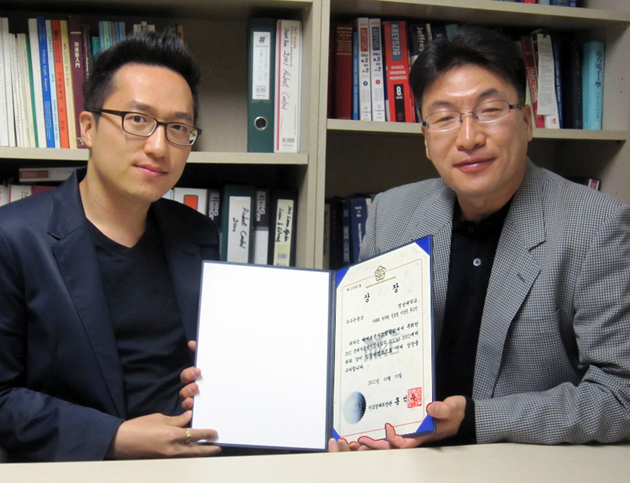 Lee, Tae-hee (left) and Professor Park, Ju-hyun winning the Minister of Knowledge Economy Award for being chosen as the best thesis in international conference
Lee, Tae-hee (left) and Professor Park, Ju-hyun winning the Minister of Knowledge Economy Award for being chosen as the best thesis in international conference Professor Park, Ju-hyun's research lab (Department of Electrical Engineering) won the Minister of Knowledge Economy Award at the ICCAS (International Conference on Control, Automation and Systems), which is the nation's largest international conference in the control, automation, robotics and systems sector.
ICCAS, which is hosted by the Institute of Control, Robotics and Systems (president Hur, Nam-Suk), held its 12th conference from the 17th to the 21st at ICC Jeju (International Convention Center Jeju), in which over 600 researchers in industries, academic and research from 29 countries attended for presentation of research theses, speeches by scholars, and workshops.
466 research theses were presented at this year's conference (55% domestic, 45% international). All of them were pre-screened and recognized for their excellence. Professor Park's team received the Minister of Knowledge Economy Award for the thesis titled 'Decentralized Guaranteed Cost Dynamic Control for Synchronization of a Complex Dynamical Network'. The Minister of Knowledge Economy Award was given to a total of three studies including that of Professor Park's.
In this paper which the first author is Lee, Tae-hee (29, PhD course in Electrical Engineering), with Professor Park Joo-hyon as the corresponding author and Jung, Ho-youl(Department of Information and Communication Engineering) and two other co-authors, it suggested a new method that could ensure performance of the system by applying the 'Dynamic Controller' in order to solve the 'Synchronization Problem' of 'Complex Dynamic Network', and thus was recognized for its academic value.
'Complex Dynamic Network' refers to a large-scale network system that is combined together in a complex form of one independent systems (i.e.: automobile, airplane, the smallest unit of brain cells - the neuron, DNA, mRNA, small-scale network systems, etc). This is the upper-most concept that oversees almost all large-scale systems around us such as internet networks, power grid, SNS, human networks, spread of diseases, food chain in nature, etc. Therefore, research on complex dynamic network is the latest field that many scientists are concentrating research on due to its usefulness and broad range of application.
One area that is attracting the most interest is the problem of synchronizing the status of sub-systems (location information, speed information, etc) that makes up the complex dynamic network. This is called the 'Synchronization Problem' and it has high academic and commercial value because it can be applied in various sectors such as communication security that requires high security, formation flight of jets, and mobile sensor networks. In order to solve this problem, various control theories based on mathematic theories such as Graph Theory and Linear Algebra are being developed. However, they are all focused only on 'Static Controller'. This is because the structure of the controller is simple making it easy to design.
However, the 'Dynamic Controller' method of Professor Park's team attracted a great deal of attention. There are much more design variables compared to static controllers, and the structure of the complex dynamic network system is much more complicated, making it much more difficult to design. However, it can contribute greatly in improving the stability and performance of the overall network system. It was assessed to have broadened the research horizons of the synchronization problem by designing distributed controller that makes it easier to control large-scale systems, while also considering the control problem to ensure minimal cost by enhancing energy efficiency.
Professor Park, Ju-hyun, who participated in the research as a thesis advisor and corresponding author, stated, "Research on complex dynamic network is a field that can be applied in many areas and that will have a large effect from natural phenomena, social phenomena, as well as various industrial sectors. Thus, we hope to conduct more in-depth academic and empirical research on various control problems to contribute in both industry and academia."
Meanwhile, Professor Park played a big role in YU being ranked 40th in the QS World University Rankings, a global university evaluation institute of England. YU was the only university in Korea to be ranked in the top 50 of the world. Professor Park published 37 SCI papers in just the last year, and while working as a professor at YU in 2000, he published over 200 SCI papers. He also scored nearly a perfect score in the thesis citation index, and is thus internationally recognized for his academic performance.










